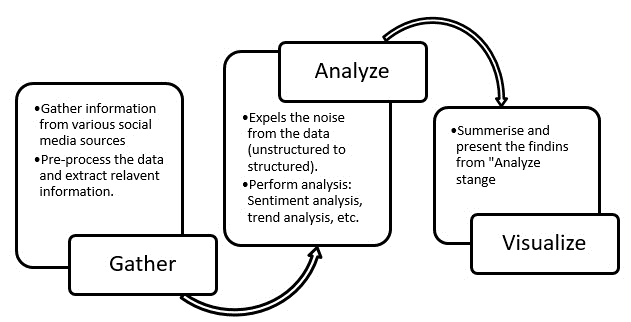Analyzing the Performance of Different Classifier for Detecting Polarity of Customer Reviews
Main Article Content
Abstract
To determine an author's emotional state from their written words is the focus of sentiment analysis, a subfield of NLP. This study focuses on the many techniques used to categorize the text reviews written in natural language according to the viewpoints expressed therein, in order to determine if the widespread behavior is positive, negative, or neutral. Streaming of thoughts and expression of opinion have been facilitated by the proliferation of debate forums, Weblogs, product review sites, e-commerce, and social networking sites. A lot of people's feelings, reviews, and assessments of others' opinions can be found on social media. This research ranks the top classifier for feelings using data derived from online product reviews posted to Twitter. Experimental work on polarity classification with well-known classifiers such as Naive byes, Support vector machine, and Logistic regression for anticipating testimonials was addressed.
Article Details
References
Rekha, K. S. (2014). Opinion Mining and Classification of User Reviews in Social Media. International Journal, 2.
Arora, D., Li, K. F., & Neville, S. W. (2015). Consumer’s sentiment? analysis of popular phone brands and operating system preference using Twitter data: A feasibility study. Advanced Information Networking and Applications (AINA), 2015 IEEE 29th International Conference on, (pp. 680-686).
Guimarães, R., Rodr?iguez, D. Z., Rosa, R. L., & Bressan, G. (2016). Recommendation system using sentiment analysis considering the polarity of the adverb. Consumer Electronics (ISCE), 2016 IEEE International Symposium on, (pp. 71-72).
Duncan, B., & Zhang, Y. (2015). Neural networks for sentiment analysis on twitter. Cognitive Informatics & Cognitive Computing (ICCI* CC), 2015 IEEE 14th International Conference on, (pp. 275-278).
Lavanya, T., Miraclin Joyce Pamila, J. C., & Veningston, K. (2016). Online review analytics using word alignment model on Twitter data. Advanced Computing and Communication Systems (ICACCS), 2016 3rd International Conference on, 1, pp. 1-6.
Jeyapriya, A., & Selvi, C. S. (2015). Extracting aspects and mining opinions in product reviews using supervised learning algorithm. Electronics and Communication Systems (ICECS), 2015 2nd International Conference on, (pp. 548-552).
Bhardwaj, N., Shukla, A., & Swarnakar, P. (2014). Users' Sentiment Analysis in Social Media Context using Natural Language Processing. The International Conference on Digital Information, Networking, and Wireless Communications (DINWC), (pp. 103).
Ahmed, K., El Tazi, N., & Hossny, A. H. (2015). Sentiment Analysis over Social Networks: An Overview. Systems, Man, and Cybernetics (SMC), 2015 IEEE International Conference on, (pp. 2174-2179).
Das, T. K., Acharjya, D. P., & Patra, M. R. (2014). Opinion mining about a product by analyzing public tweets in Twitter. Computer Communication and Informatics (ICCCI), 2014 International Conference on, (pp. 1-4).
Turney, P. D. (2002). Thumbs up or thumbs down?: semantic orientation applied to unsupervised classification of reviews. Proceedings of the 40th annual meeting on association for computational linguistics, (pp. 417-424).
Mostafa, M. M. (2013). More than words: Social networks’ text mining for consumer brand sentiments. Expert Systems with Applications, 40, 4241-4251.
Mishra, A., & Jain, S. K. (2014). An Approach for Computing Sentiment Polarity Analysis of Complex Why-type Questions on Product Review Sites. Research in Computing Science, (pp.84, 65- 76).
Mosami Pulujkar, Sunil Kumar, Vivek Deshpande, Dattatray Waghole. (2023). Design and Implementation of the SIRC Protocol for Achieving QOS Parameters in Wireless Sensor Networks. International Journal of Intelligent Systems and Applications in Engineering, 11(2s), 311–315. Retrieved from https://ijisae.org/index.php/IJISAE/article/view/2698
Lovins, J. B. (1968). Development of a stemming algorithm. Mech. Translat. & Comp. Linguistics, 11, (pp.22-31).
mAkhtar, M.J.; Ahmad, Z.; Amin, R.; Almotiri, S.H.; Al Ghamdi, M.A.; Aldabbas, H.J.C. An efficient mechanism for product data extraction from e-commerce websites. Comput. Materi. Contin. 2020, 65, 2639–2663.
Aleem, S.; Huda, N.u.; Amin, R.; Khalid, S.; Alshamrani, S.S.; Alshehri, A.J.E. Machine Learning Algorithms for Depression: Diagnosis, Insights, and Research Directions. Electronics 2022, 11, 1111.
Mr. Dharmesh Dhabliya, Dr.S.A.Sivakumar. (2019). Analysis and Design of Universal Shift Register Using Pulsed Latches . International Journal of New Practices in Management and Engineering, 8(03), 10 - 16. https://doi.org/10.17762/ijnpme.v8i03.78
Alantari, H.J.; Currim, I.S.; Deng, Y.; Singh, S. An empirical comparison of machine learning methods for text-based sentiment analysis of online consumer reviews. Int. J. Res. Mark. 2021, 39, 1–19.
Harris, K., Green, L., Perez, A., Fernández, C., & Pérez, C. Exploring Reinforcement Learning for Optimal Resource Allocation. Kuwait Journal of Machine Learning, 1(4). Retrieved from http://kuwaitjournals.com/index.php/kjml/article/view/155
Yadav, V.; Verma, P.; Katiyar, V. E-commerce product reviews using aspect based Hindi sentiment analysis. In Proceedings of the 2021 International Conference on Computer Communication and Informatics (ICCCI), Coimbatore, India, 27–29 January 2021; pp. 1–8.
Desai, Z.; Anklesaria, K.; Balasubramaniam, H. Business Intelligence Visualization Using Deep Learning Based Sentiment Analysis on Amazon Review Data. In Proceedings of the 2021 12th International Conference on Computing Communication and Networking Technologies (ICCCNT), Kharagpur, India, 6–8 July 2021; pp. 1–7.
Mohbey, K.K. Sentiment analysis for product rating using a deep learning approach. In Proceedings of the 2021 International Conference on Artificial Intelligence and Smart Systems (ICAIS), Coimbatore, India, 25–27 March 2021; pp. 121–126.
Darokar, M.S.; Raut, A.D.; Thakre, V.M. Methodological Review of Emotion Recognition for Social Media: A Sentiment Analysis Approach. In Proceedings of the 2021 International Conference on Computing, Communication and Green Engineering (CCGE), Pune, India, 23–25 September 2021; pp. 1–5.

